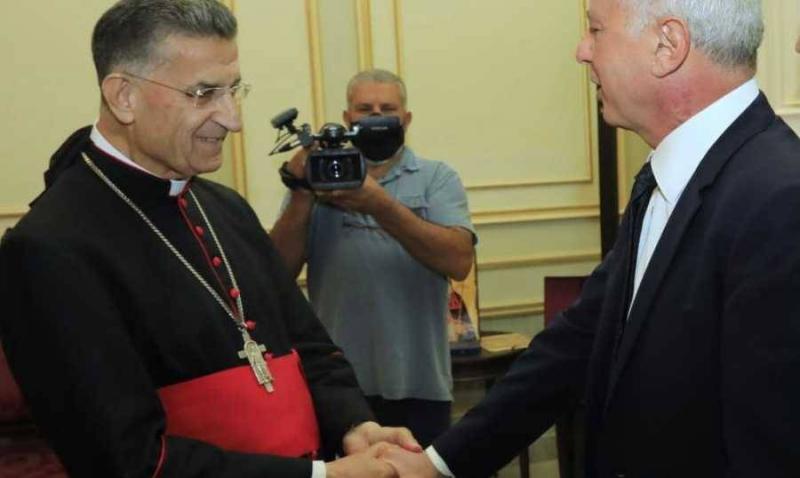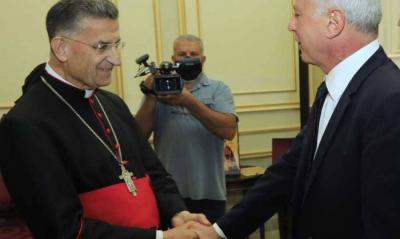Sleiman Franjieh, the head of the Marada Movement, has recorded a black mark in his relationship with the Maronite Patriarchate. Bkerke did not take kindly to the Marada's boycott of meetings at the patriarchal headquarters, despite the repeated attempts by the Archbishop of Antelias, Bishop Antoine Bou Najm, to communicate with Franjieh, as reported by "Nidaa al-Watan." While waiting for what the holiday season will bring, Bkerke's insistence on continuing its efforts to reach a unified Christian national document remains clear, even in the absence of the Marada.
The recent parliamentary elections have diminished the Marada's representative stature, although the moral authority of the Franjieh family's leadership and Sleiman Franjieh's personal significance remain intact. Hezbollah and Amal Movement worked to return him to the parliamentary scene with an artificial bloc and subsequently endorsed his candidacy for the presidency. Despite the fact that the Shiite duo is the strongest and in power, this has not granted Franjieh a passport to the Baabda Palace due to Christian rejection of him.
The Marada Movement's boycott of Bkerke meetings erodes what remains of Franjieh's standing in the Christian community. A look at the history of the modern relationship between Franjieh and Bkerke reveals many ups and downs, but it has never reached the level of a complete rupture. Respect remained the prevailing sentiment even during the Syrian occupation, where Franjieh was the favored son of the regime, while Patriarch Mar Nasrallah Boutros Sfeir led the resistance against that occupation. Franjieh continued to visit Bkerke and maintained a good relationship with the patriarch. Even after personal insults directed at Sfeir in 2005 amidst chants of "You are the patriarch, Suleiman," Bkerke’s doors remained open to Franjieh throughout Sfeir's tenure.
Franjieh built a good relationship with the patriarch and participated in Bkerke committees, which included him among the list of four leaders restricted to those with presidential nominations for the first time in a precedent emerging from the patriarchal headquarters, with promises from these leaders not to boycott the electoral sessions. However, Franjieh broke this promise and boycotted along with General Michel Aoun.
Hope for Franjieh's potential election as president rose after he received the support of President Saad Hariri in the fall of 2015, and Bkerke blessed this move, but the Christian agreement between the Lebanese Forces and the Free Patriotic Movement undermined the deal, as did the Maarab Agreement that entailed Aoun’s nomination with Bkerke's approval, leading to some distance between Bkerke and Benchekroun.
Patriarch Raï attempted to mediate reconciliation between Franjieh and Aoun but did not reach a result, and the dispute remained heated. Despite everything that has transpired, Franjieh had not boycotted Bkerke until recently, which has been a blow to Franjieh as the Maronite Patriarchate presses forward with its document currently in preparation. The absence of Marada from meetings has not affected this process, indicating the true significance and real influence of the Zgharta bloc according to "Nidaa al-Watan."
The justifications provided by the Marada that they are not boycotting Bkerke, but rather the Free Patriotic Movement, have not convinced the Christian public. The document was written by Patriarch Raï, not by President Aoun or MP Gibran Bassil, and the place of discussion is Bkerke, not Rabieh, thus all those excuses and justifications have collapsed, especially since the Marada’s relationship with the other parties is good.
The Church does not deny feeling let down by Franjieh after this boycott, questioning: if Hezbollah's Secretary-General, Sayyed Hassan Nasrallah, invited Franjieh to meet with Aoun and Bassil, would he have refused? Such a meeting at this moment would help bridge the gap, and every gathering holds potential benefits - which is what the church is attempting to achieve.
All eyes remain focused on Bkerke during the holiday period, wondering if Franjieh will visit the patriarch to offer congratulations or continue his boycott to prove that the reason is not solely about the Free Patriotic Movement, but rather his unwillingness to meet with Christian parties and avoid embarrassment. On one hand, he cannot anger Hezbollah by agreeing to terms that limit arms exclusively to the state, and on the other, he cannot confront alone and depict himself as the defender of Hezbollah’s arms, contrary to the consensus view of Christians who perceive this weaponry as dangerous.




